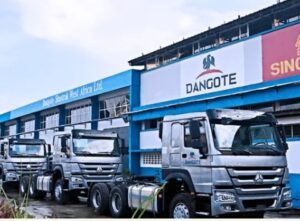Dangote’s 4,000 CNG Trucks Shake Up Fuel Supply Chain, Tanker Drivers Raise Job Loss Fears
Dangote’s 4,000 CNG Trucks Shake Up Fuel Supply Chain, Tanker Drivers Raise Job Loss Fears

With less than a month before the Dangote Refinery begins deploying 4,000 Compressed Natural Gas (CNG) trucks across Nigeria, the fuel distribution landscape is witnessing major shifts that are sparking concern among tanker drivers and traditional suppliers.
Sources confirm that at least 25 petroleum marketers have now entered into direct fuel supply agreements with the Dangote Refinery—up from just three initially—marking a significant increase in industry alignment with the refinery’s logistics strategy ahead of its August 15 launch.
This shift signals Dangote’s readiness to bypass conventional fuel transportation channels by supplying petrol, diesel, and aviation fuel directly to marketers, manufacturers, and sectors like telecoms and aviation. The refinery’s move is widely seen as a bold disruption of Nigeria’s long-standing fuel supply chain.
Drivers and Suppliers on Edge
The development has triggered alarm among petroleum tanker drivers, many of whom fear widespread job losses once Dangote begins handling distribution with its in-house fleet of trucks. By cutting out intermediaries, the new system could leave thousands of drivers and transport operators out of work.
According to a Dangote Group executive who spoke on condition of anonymity, marketers are signing up quickly to ensure access to products as the refinery scales up its operations. “We’ve gone from three to 25 strategic partners, and more are registering every day,” the source revealed.
Dangote’s direct distribution is designed to address the nation’s reliance on imported refined fuel and to boost availability nationwide—particularly in underserved regions like northern Nigeria. Industry observers believe the initiative could ease supply bottlenecks and stabilize fuel prices.
Growing Scrutiny and Resistance
Despite the potential benefits, not everyone is optimistic. Some industry groups are cautioning against what they view as a growing monopoly. The Petroleum Products Retail Outlets Owners Association of Nigeria (PETROAN) has warned that while Dangote’s move might offer short-term gains, it could ultimately create market imbalance.
“We’ve seen this before—in flour, sugar, cement. Prices don’t stay low when competition is pushed out,” said Billy-Gillis Harry, PETROAN’s National President. “This may look like a gift now, but the long-term implications could be damaging.”
The Natural Oil and Gas Suppliers Association of Nigeria (NOGASA) has scheduled a high-level meeting on July 31 in Abuja to assess the potential fallout. A circular from NOGASA’s Secretary-General, Tunde David, confirmed the NEC meeting would focus on the expected impact on its members’ livelihoods.
A Refinery in High Gear
The Dangote Refinery, which began operations in January 2024, has already made significant strides. After launching diesel and jet fuel production earlier in the year, the facility began refining Premium Motor Spirit (PMS) in September 2024. By February 2025, the refinery reported it had reached 85% of its 650,000-barrel-per-day capacity.
With the full launch of its CNG-powered fleet on the horizon, Dangote is poised to reshape Nigeria’s downstream oil sector—setting the stage for new efficiencies but also new tensions.
TRENDING SONGS
 NPMA Appeals to Nigerian Government for Compensation After Lagos Market Fire
NPMA Appeals to Nigerian Government for Compensation After Lagos Market Fire
 Rest Every Four Hours, FRSC Issues Safety Guide for Fasting Motorists
Rest Every Four Hours, FRSC Issues Safety Guide for Fasting Motorists
 NNPC Boss Ojulari Bags UK Energy Institute Fellowship
NNPC Boss Ojulari Bags UK Energy Institute Fellowship
 Shock in Anambra: Bride Disappears Moments Before Wedding
Shock in Anambra: Bride Disappears Moments Before Wedding
 Nigerian Woman Returns ₦330 Million Accidentally Credited to Her Account
Nigerian Woman Returns ₦330 Million Accidentally Credited to Her Account
 APC Don Reach Morocco?’ VeryDarkMan Reacts to Seyi Tinubu Poster
APC Don Reach Morocco?’ VeryDarkMan Reacts to Seyi Tinubu Poster
 Bride Breaks Down in Tears as Wedding Meals Were Kept Secretly While Guests Go Home Hungry
Bride Breaks Down in Tears as Wedding Meals Were Kept Secretly While Guests Go Home Hungry
 Odogwu by Day, Robber by Night: How Marriage Joy Turned Into Tragedy
Odogwu by Day, Robber by Night: How Marriage Joy Turned Into Tragedy
 Nigerian Officials Allegedly Pocket N4–6B Weekly Through Smuggling Cartels at Seme–Badagry Border
Nigerian Officials Allegedly Pocket N4–6B Weekly Through Smuggling Cartels at Seme–Badagry Border
 Ahmad Yerima: Naval Officer to Face No Sanctions After Clash with Wike – Matawalle
Ahmad Yerima: Naval Officer to Face No Sanctions After Clash with Wike – Matawalle
Share this post with your friends on ![]()













